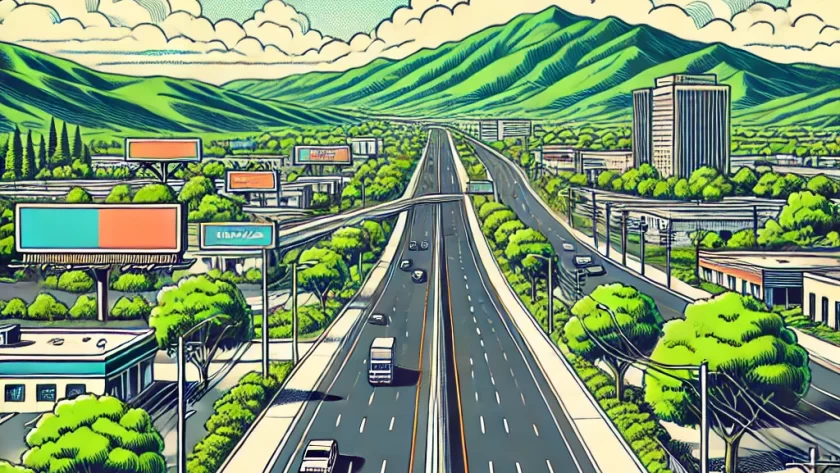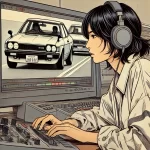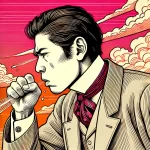中央フリーウェイ [Chūō Furīwē]
荒井由美 [ARAI Yumi]
Words & Music : 荒井由美 [ARAI Yumi]
“Chuo Freeway” is a song from Yumi Arai‘s fourth album, released in 1976, before she changed her name to Yumi Matsutōya or “Yuming.” The title is based on an actual highway. The song reflects memories of Matsutōya Masataka driving Yuming home from work. She mentioned that the car used at the time was “Toyota Mark II with a poop-colored paint.”

中央フリーウェイ
Chūō Furīwē
調布基地を追い越し 山にむかって行けば
Chōfu Kichi o oikoshi yama ni mukatte ikeba
- 中央 [chūō] : center
- 追い越す(おいこす) [oikosu] : overtake
- 山(やま) [yama] : mountain
- 向かう(むかう) [mukau] : head towards
- 行く(いく) [iku] : go
(translation) “On Chūō Furīwē,
passing by Chōfu Kichi, heading toward the mountains.”
The title “Chuo Freeway” refers to the Chūō Expressway, a highway. The song describes the scenery of the road leading west from Tokyo. “Chōfu Kichi” refers to a former U.S. military base in Chōfu. Continuing straight in this direction, you would reach Mount Fuji wiki.
As a side note, heading north from central Tokyo leads to Saitama, east to Chiba, and south to Yokohama (also see “Blue Light Yokohama“). However, if you go west, you’re still in “Tokyo.” The scale is completely different, but it’s like leaving New York City but still being in New York State. Therefore, for those who want to live in a place called “Tokyo,” West Tokyo is recommended.
黄昏がフロント・グラスを 染めて広がる
tasogare ga furonto gurasu o somete hirogaru
- 黄昏(たそがれ) [tasogare] : twilight
- フロントガラス(ふろんとがらす) [furonto gurasu] : windshield
- 染める(そめる) [someru] : dye
- 広がる(ひろがる) [hirogaru] : spread
(translation) “The twilight dyes the windshield and spreads out.”
The word “tasogare” also appeared in “Lipstick Message (Rouge no Dengon).” By the way, this song was also a candidate for the theme song of “Kiki’s Delivery Service,” but because it contains specific Japanese place names, it didn’t match the European setting of the movie and wasn’t ultimately chosen.
In Japanese, “ガラス / garasu” refers to glass materials like windows, while “グラス / gurasu” refers to items like drinking glasses or glasses. Yuming’s choice of words is always unique but correct.
中央フリーウェイ
Chūō Furīwē
片手で持つハンドル 片手で肩を抱いて
katate de motsu handoru katate de kata o daite
愛してるって 言ってもきこえない
aishiteru tte ittemo kikoenai
風が強くて
kaze ga tsuyokute
- 片手(かたて) [katate] : one hand
- 持つ(もつ) [motsu] : hold
- ハンドル(はんどる) [handoru] : steering wheel
- 肩(かた) [kata] : shoulder
- 抱く(だく) [daku] : embrace
- 愛している(あいしている) [aishiteiru] : love
- 言う(いう) [iu] : say
- 聞こえる(きこえる) [kikoeru] : hear
- 風(かぜ) [kaze] : wind
- 強い(つよい) [tsuyoi] : strong
(translation) “On Chūō Furīwē,
holding the steering wheel with one hand, embracing your shoulder with the other,
saying ‘I love you,’ but you can’t hear it,
because the wind is strong.”

町の灯が やがてまたたきだす
machi no hi ga yagate matataki dasu
二人して 流星になったみたい
futari shite ryūsei ni natta mitai
- 町・街 [machi] : town, city
- 灯(ひ) [hi] : light
- やがて [yagate] : soon
- 瞬く(またたく) [matataku] : twinkle
- 二人(ふたり) [futari] : two people
- 流星(りゅうせい) [ryūsei] : shooting star
- みたい [mitai] : like
(translation) “The town lights start to twinkle,
as if we were two shooting stars.”
In Japanese lyrics, the word “machi” appears frequently. Comparing the kanji “街” and “町,” “街” gives the impression of a larger area. Since it’s in the suburbs of Tokyo, “町” was chosen.
In administrative divisions, there are classifications like “市 / shi” (=city), “町 / machi” (=town), and “村 / mura” (=village) based on the scale.
中央フリーウェイ
Chūō Furīwē
右に見える競馬場 左はビール工場
migi ni mieru keibajō hidari wa bīru kōjō
この道は まるで滑走路
kono michi wa marude kassōro
夜空に続く
yozora ni tsuzuku
- 右(みぎ) [migi] : right
- 競馬場(けいばじょう) [keibajō] : horse racing track
- 左(ひだり) [hidari] : left
- ビール工場(びーるこうじょう) [bīru kōjō] : beer factory
- 道(みち) [michi] : road
- 滑走路(かっそうろ) [kassōro] : runway
- 夜空(よぞら) [yozora] : night sky
- 続く(つづく) [tsuzuku] : continue
(translation) “On Chūō Furīwē,
a horse racing track visible on the right, a beer factory on the left,
this road is like a runway,
leading to the night sky.”
The actual scenery includes places like the Suntory wiki Beer Factory and the Tokyo Racecourse.
中央フリーウェイ
Chūō Furīwē
初めて会った頃は 毎日ドライブしたのに
hajimete atta koro wa mainichi doraibu shita noni
このごろは ちょっと冷いね
konogoro wa chotto tsumetai ne
送りもせずに
okuri mo sezu ni
- 初めて(はじめて) [hajimete] : first time
- 会う(あう) [au] : meet
- 頃(ころ) [koro] : time
- 毎日(まいにち) [mainichi] : every day
- ドライブ(どらいぶ) [doraibu] : drive
- この頃(このごろ) [konogoro] : these days
- ちょっと [chotto] : a little
- 冷たい(つめたい) [tsumetai] : cold
- 送る(おくる) [okuru] : send, see off
(translation) “On Chūō Furīwē,
we used to drive every day when we first met,
but these days, you’re a bit cold,
not even seeing me off.”
The lyrics mention that these days, the person doesn’t see her off anymore. But in November 1976, when the album containing this song was released, Yuming married Matsutōya Masataka. Afterward, she continued her music career under the name Yumi Matsutōya (In Japan, it is customary for married couples to share the same surname.) She mentioned considering quitting singing to focus on songwriting after getting married, but Yuming’s music releases show no sign of stopping.
In 2023, a rearranged version with additional lyrics was produced under the name “Yoasobi cheers Matsutōya Yumi.” Please listen to that version as well.
Thanks for reading! Feel free to comment if you have any feedback or questions.
Follow me on X.



